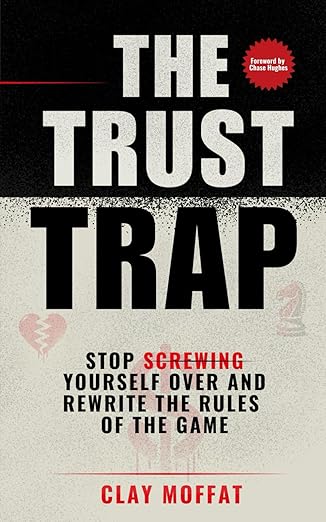Explore More
The Trust Trap- How Blind Spots and Betrayal Make You Reframe Self- Perception
"The Trust Trap" by Clay Moffat explores how moments of betrayal and overlooked blind spots can force a powerful re-evaluation of self-perception. When trust is broken, it doesn’t just reshape our view of others, it challenges the very lens through which we see ourselves.

The appetite for direct, actionable strategies in performance and self-help literature is intensifying as a new wave of readers seeks bolder frameworks to tackle trust and betrayal. This sharper focus, moving away from reassurance and towards hard-nosed problem-solving, is reshaping expectations in the field. Authors with backgrounds in high-pressure disciplines are bringing raw, evidence-based methodologies to market, challenging the conventions of trust as a virtue and offering a path to measurable self-mastery.
This trend finds clear expression in the recent reaction to Clay Moffat’s ‘The Trust Trap: Stop Screwing Yourself Over and Rewrite the Rules of the Game’. Written amid the author’s fight against near-blindness, the book’s brutal assessment of trust and betrayal resonates with audiences ranging from entrepreneurs to elite athletes who refuse to accept business as usual. The rapid accrual of more than 50 five-star Amazon reviews, all without traditional publicity, underscores a shift in what readers value: strategic frameworks, not platitudes.
Recent years have seen a rising number of self-help and business titles reject conventional wisdom about trust and relationships, focusing instead on high-performance strategies and psychological resilience. Targeted at readers determined to escape destructive behavioural loops, these books distinguish themselves by promising specific, actionable frameworks rather than aspirational advice. The surge in positive reviews for Moffat’s title reflects this shift, with verified purchasers praising its ‘radical responsibility’ and ‘real results’ as essential tools for self-direction.
Market Demands Accountability and Tactical Frameworks
Industry observers note this demand for empirical, field-tested solutions is driving a wider trend seen in the popularity of business psychology works by figures such as Mark Manson, Jocko Willink and Steven Pressfield, all of whom advocate for responsibility, decisive action and clear results. Recent market analysis from IPG’s BookScan division has mapped a growing preference for no-nonsense delivery and measurable outcomes, particularly among professionals burnt by conventional leadership tomes.
Trust as a High-Risk Variable
Moffat’s assertion that ‘trust isn’t a virtue, it’s a perceptual glitch’ represents a wider reevaluation in the industry. His frameworks, such as The SNITCH and Authority Override Protocol, equip readers to spot deception and reclaim agency, channelling the urgency of military and high-stakes business environments. In doing so, ‘The Trust Trap’ directly addresses the root sources of self-sabotage and betrayal, positioning itself as an operational manual for those unwilling to fall victim to recurring patterns.
The direct approach is matched by Moffat’s own experience working with PGA athletes, founders, and special operations veterans. His unfiltered playbook, created under extreme personal pressure, serves as both a case study in overcoming adversity and a resource for sustainable, long-term behavioural change.
” You’ve Been Lied To About Trust and It’s Cost You”
This new direction is also mirrored by competitors like ‘Atomic Habits’ by James Clear and ‘Can’t Hurt Me’ by David Goggins, which similarly stress strategic adaptation and uncompromising introspection. These titles have set a high bar for authenticity and practical guidance, pushing the industry to measure value in terms of results delivered—not emotions placated. Critical analysis from trusted sources such as Publishers Weekly industry reports confirm that sales and review patterns reward books delivering tactical value over conventional inspiration.
“Trust is a Weapon”
‘The Trust Trap’ also benefits from industry connections, such as its foreword by Chase Hughes, who is recognised for his expertise on behaviour and influence. This further establishes the title’s credibility with a high-performance readership demanding peer-validated frameworks. The participation of top influencers highlights a discernible trend: the most successful self-help titles now source their authority from outside the publishing world, harnessing the experience of high-stakes fields to meet complex psychological needs.
Results Matter: Readers Validate Direct Performance Wisdom
The flood of high-impact reviews for ‘The Trust Trap’, each one focusing on measurable changes in behaviour and perspective, delivers proof that the market is pivoting away from abstract encouragement. Comments like ‘no-nonsense, direct and in-your-face information’ highlight the growing reader intolerance for evasive or sugar-coated messaging. Online community discussions and business media commentary increasingly cite field-tested methodologies as the main driver behind renewed trust in the self-improvement genre.
This trend aligns with ongoing analysis of buying patterns published by Nielsen BookScan, which reveal that actionable, process-driven content is currently outpacing general motivational books in year-on-year sales growth. As more professionals and entrepreneurs look to hard-edged methodology to secure a competitive edge, authors equipped with real-world testing and a results-oriented philosophy are gaining ground.
Raising Standards in Trust and Betrayal Analysis
As the performance coaching market continues to reward hard-earned insight and tactical clarity, expect further divergence from legacy models of trust-building that rely on ideology over scrutiny.
The growing success of books like ‘The Trust Trap’ signals an industry in which readers refuse to cede agency, demanding instead actionable wisdom capable of immediately insulating them from risk and loss.
In this high-accountability future, the winners will be those who can offer blueprints, not bromides.
Do you want to share your story and inspire our readers ? Know that YOUR EXPERTISE is paving the way for a fairer, happier society.




